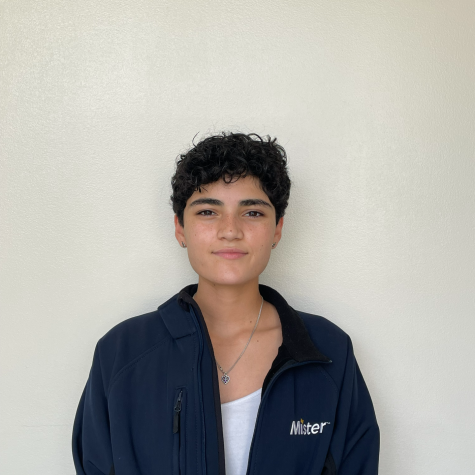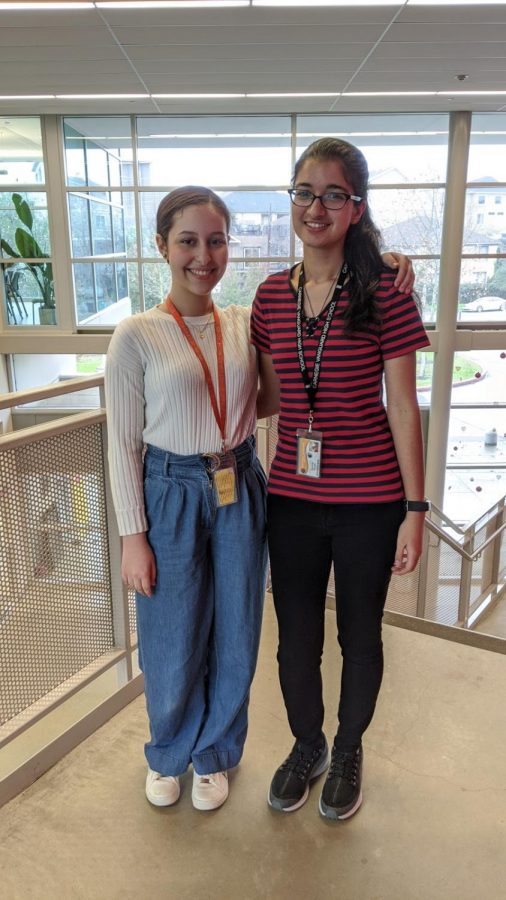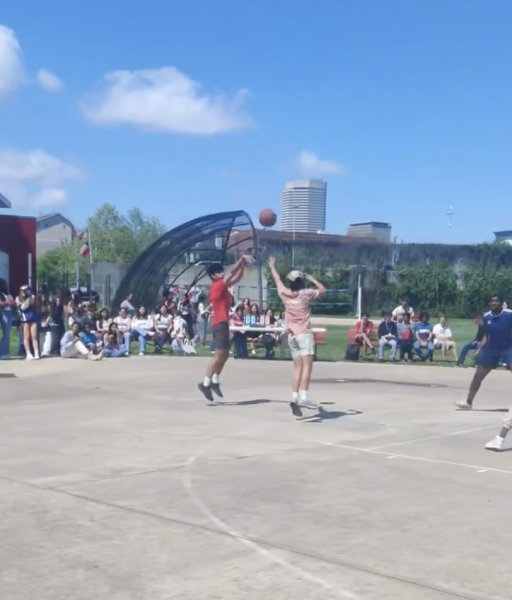Meet CVHS’ Award-Winning Writers Asmita Ahuja and Naomi Canny
By Katherine Linares, Editor In-Chief|February 15, 2020
Scholastic Gold-Key Winners in writing, Naomi Canny on the left, Asmita Ahuja on the right.
Every year, hundreds of thousands of students all around the US send writing into scholastic competitions, which choose a selected few to advance into the regional competition, those are the gold key winners. Two of which are CVHS sophomores Naomi Canny and Asmita Ahuja. Canny with 3 gold keys and Ahuja with two gold keys. Both writers have two very distinct writing styles, one who loves twists and turns that express some sense of reality, and the other who loves fantastical ideas, ideas of escaping the current reality. There is one thing that they have in common. Their love for writing.
“I really like to write, I think it is one of my biggest passions. I love sharing my thoughts and emotions with other people,” said Ahuja
In her poem, “Shattered Dreams and Diminished Hopes” Ahuja describes the hard times she has gone through with her family, yet even after everything, they stayed together;they built each other up regardless of their circumstances. It is a poem about unity and family relations, which is a common topic in Ahuja’s poems. Her main inspiration is her family and mother.
“My family is one of my biggest inspirations because one of my memoir [“Shattered Dream and Diminished Hopes”] was about my family and the fluctuating of hard times with them. My mom is one of my biggest inspirations as well because I wrote a lot of stories and poems relating to her mother[her grandmother] and mother’s love,” said Ajuha.
Similarly, Canny’s biggest inspiration is her grandmother.She describes her as her “muse” when writing.
“I lost my grandma in 2014, to pancreatic cancer, and I write a lot of poems about things like the sun and flowers and things because they’re things that she really liked and things that I really liked and things that kind of symbolized our bond. So she’s always been like the Muse even when I don’t like to think about it, she’s always been in the back of my mind the driving force for me when I write,” said Canny.
I change like the wind and tide
Like the weather
One day I’m a hot California day, the other I’m a damp London sky, crying on the world
Some days I am purple
Blue for when I am calm and at ease, lulled to sleep by the waves that raised me
Red for when I’m determined and burning inside like a flickering flame, ready to ignite at any moment
But then I am overpowered by a cloud
A cloud whose color I cannot describe
But it remains above my head, looming over me like an unforgiving shadow
I am afraid and vulnerable
I am shy and awkward
But I am still unapologetic
I will not apologize for disagreeing with you
I will not change my ways and my wills because that is what floats your boat
What floats mine is honesty, even if it hurts
I may anger you with my transparency
If you want me to change, walk away now
Walk away with the regret of not embracing me for who I am
Walk away knowing you had the chance to be around me
Walk away longing for me to just look at you
But I won’t let these deep brown eyes wander your way
You may think that I need you
But really you are Pluto in my solar system
I am nothing but the sun, burning bright and guiding those who will embrace me
Leading the people who have doubts, who grow weary from sadness and fear
Yet I hide behind the clouds at times because even the sun can be afraid
Even the sun can cry
I’m sorry, I don’t mean to burn your eyes or make them sting
I don’t mean to intimidate you or wake you up from your luscious nap
The clouds act as my covers, as my bed
And when it is dusk I must enter the sky, the stage in which I must perform
But the stars have to urge me to go on the stage, for the show is no show without my bright demeanor
I feel like an old woman, not motivated to take a step and leave the comfort of her home
Yet yearning for an adventure
Yearning for a chance to prove myself
To prove that I mean something in a large world, that I am not just a number
I will say I don’t need you, but I do
I’m stubborn and childish, yet wise beyond my years
Wisdom is not always found in the to and fro of a rocking chair
Or the click of knitting needles against exuberant seas of wool
It is found in those who are willing to accept the world as it is
As something that can be improved, but still possesses an ethereal beauty
Remember that the flowers cannot blossom without rain
That the trees cannot branch out in their proud grandeur without the tiny water droplets that fall from the sky
Well what if we all were droplets
What if each of us could make a whole field flourish, with fruits and flowers adorning a lush green landscape
In failure, there is a success
In sadness, there is unfathomable joy
But if you are trapped, why won’t you try to get out?
If you’re trying, try harder
If you have to gasp for air after being devoured by a sea of quicksand, then reach out
Do not be afraid to cry for help, to scream from the top of your lungs
We were not made to work alone, the same as one single rain droplet cannot help a withering flower
In vulnerability, there is a great power
And I know that swallowing your pride is hard
It’s like swallowing the most bitter pill with a lingering aftertaste
So strong it stays for days and days
But once you’ve swallowed it, it’s gone
The pill may be in your mind
Its residue may be buried somewhere within you
But you must forget it ever was
Learn to walk again, and fall
Until you fall, you have not truly walked
Until you cry, you have never truly laughed
Wipe your tears dry, but never try to suppress them
For they are the droplets that could make a flower bloom
“Persephone” and “Bloom” demonstrate her connection with the very subtle use of nature symbolism. In her poem “Bloom”, she describes herself in a mass array of similes and personifications, making a strong correlation between herself and nature. Describing herself as the London sky, the ocean waves, the sun, and then returning to a flower. She presents herself as unapologetic, yet vulnerable, fierce but calm., independent, yet dependent. Through the array of similes, Canny gives the connotation that although bad things happen in life, you need to cope and cry in order to grow again, just like flowers need the rain to survive.
“I developed this analogy to say that vulnerability is a very beautiful thing. And vulnerability is the thing that actually led to me being able to accept myself and my friends, being able to get on with their lives, It brings life to the flowers and the trees and, you know, with every bad thing comes to a good thing and it’s important to know that there are good things along with the bad and that’s what makes life worthwhile,” said Canny.
Illustrating the mass array of emotion that she puts into her poems, displaying the need for poetry as an “outlet to cope with stress”.
Both authors also ponder how the world would look through somebody else’s eyes.
Is it only 5 in the morning, the sun still asleep and the sky as dark as night? Does the janitor wake up promptly when the alarm rings? Does he hit the snooze button or the stop button? Can he hit the snooze button?
Did the janitor sleep well enough to leave the bed with regained energy for the day? Does he know at what hour he will lie on this bed again? Will he lie on this bed again? Is his small apartment on St.Louis Avenue in the state of Missouri large enough to fit anything besides the tattered mattress? Do his eyes seek someone to greet during the early morning only to realize that he is home with himself? Does the janitor wash the clothes from the night before? Does he have the technical requirements to wash the clothes? Will he choose a nicely ironed pants and a collared shirt to wear to work or will he wear the same unironed, untidy, and baggy blue uniform as yesterday? And the day before? Do the clothes still fit him? Are they too big for his empty stomach and bones without flesh?
Has the janitor gotten proper lessons on how to ride his bicycle through the morning traffic? Did his father help him get up when he fell while riding the bike for the first time? Or was his father not there to help him because he, too, was awake at 5 in the morning, doing his janitor duties? Did he buy the bicycle or obtain it through other means? Are the tires filled with enough air or are there chances of an accident? Do the scars on the janitor’s upper left arm indicate that an accident has happened before? Does he glance at the cars driving side by side to his bicycle and imagine himself in the front seat? Does he imagine his daughter and wife with him in the back, laughing and sharing gentle banter through the ride? Was he able to bring them back home after he failed to achieve the promised promotion? Is he truly able to go about his day or does he only think of ways to bring his beloved toddler, who has curly blonde hair and an angelic voice, and beloved wife, who had beared days of hunger and hardship, back home?
Does the janitor arrive at the K-8 school, which is 3 miles away from his apartment complex, on time? Do authorities have concerns about whether or not he arrived on time? As the janitor unfolds the crease in his shirt and glosses on a difficult smile, is he able to stop pondering about the promotional announcements that will be held a few hours later? Has the janitor already noticed the students running in complete chaos and long lines for breakfast? Has the janitor had breakfast? Can he almost taste the warm bread that the middle schooler in front of him is so casually munching on? When was the last time he was able to experience this taste? Does the middle schooler, who has yet to complete his homework before class starts, notice the janitor’s eyes peering towards his bread? Will the student offer the remnants of the bread to the blue-uniformed man? Will he do it before he discards the leftover pieces while leaning his chubby body over towards the trash?
As the janitor walks through the halls towards the cafeteria, do the students smile at him? Does the janitor keep his head low during the dreadful walk, knowing his presence will be unnoticed? Does he notice the tall and skinny girl walking towards him with a smile on her face? Since how long has she been admiring the janitor’s hard work and dedication for her school? A few years? Months? Days? Does the girl, who yearns for a loving father, know that the janitor is far from his daughter? Or will she simply continue to smile at him each day and go unnoticed?
Will the janitor continue to clean the tables of the cafeteria for hours? Does he ever clinch his nose at the sharp minty smell of the soap? Do his hands hurt after using the same cloth nonstop? Or does he continue his task without a single complaint? How many times has he pulled out his small and slightly broken flip phone from his pocket to check for missed calls? After seeing the blank screen, will he break down into tears and lose hope of ever meeting his daughter?
When the bell for lunch lets out a loud Ring!, does the janitor feel startled or has he gotten too used to the sound? When he leaves the cloth for minutes, does he smile at the children who are pouring into the cafeteria? Does the small chubby kid who is eating his pasta notice the janitor staring at him? Or instead, does he stare back at the janitor and wonder why he always looks so incomplete and unhappy? Will the janitor make an annoyed face when the kid spills his pasta around the table? Why can’t he make this face? Is it because he isn’t allowed to? Or because it is pointless since the janitor has to clean the tables again anyways? Why does the janitor run to the lunch line and grab a bread? Does he eat it to fill his stomach which has been empty all day? Or does he choose to save the bread for his daughter who he thinks may still return?
When the announcements come on and the principal requests all the janitors to arrive at the gym for the promotion ceremony, does the janitor panic? Why does he begin to shiver with fright and anxiety? Why does the world seem to become blank and why are his feet stuck to the ground? Does he walk to the gym in a rush to know the results or does he walk as slow as possible, afraid of his failure? What does he think when he sees several janitors walking towards the gym? What about Sally, the blonde janitor who arrived to work promptly each day and was loved by all the students? What about Harold, who could afford to iron his uniform each evening and was always seen with students in the halls? What about Dylan, the red-haired janitor who had brought his younger son to the school several times and for whom the promotion wouldn’t have been too important? Did the janitor, Steve, stand a chance against these talented workers? Nevertheless, he had to try for his beloved family, right?
As the principal walks onto the stage, what does he think of all the janitors in front of him? Does he notice Steve, trembling with fear and worry? Does he realize how important this promotion is to him, or does he only notice his frowning face and sucked in bones? How long does the principal take to announce the name of the recipient? A few seconds? Minutes?
While tugging to his shirt and closing his eyes, does the janitor hear the principal correctly? Or does he look towards the stage for the principal to say the name again? When he hears his name called, “Steve”, does the janitor run towards the stage or does he stay put, not knowing how to react? Amidst the cheers that fill the room, does he feel two gentle taps on his shoulder? How eagerly does the janitor turn around?
Does the janitor recognize his beloved daughter immediately? Her beautiful and long blonde hair? Her golden eyes and beautiful voice calling out, “Dad!”? What about his wife, who is smiling with joy after hearing about her husband’s promotion?
Steve smiles wide and lets tears trickle from his eyes as he wraps his daughter and wife into his arms. Within that moment of love and end to the desperate separation that he had from his family, the janitor felt like the richest and most content person in the world.
In “Regarding the Janitor”, Ahuja explores how the life of someone who typically goes unnoticed, someone who is forced to work as a janitor, forced to live life in the lower class. The vivid imagery illustrates the condition of his clothes, the scraggly frame of someone barely getting by paycheck to paycheck. Showing the restlessness and weariness of his state of mind and body through the early mornings and late nights. Through a vast array of questions, she shows a man’s deepest thoughts, thoughts engulfed by fear and pain. Fear of not bringing back a paycheck for his family, the pain of a growling stomach as he is forced to watch those more privileged than he. Yet through all this hopelessness, he is still admired by another unnoticed soul, a young girl, who realizes his troubles. But just as soon as the negativity turns to light, worry haunts his mind all over again, as he and dozen other janitors file into a room, anxiously waiting to hear who got a promotion. To his surprise, his name is called, with his wife and daughter standing there. Standing with glee in their eyes. Ending the poem with a warm tone of joy, giving the fairytale ending.
“Each sentence was a question. And through the questions, a story was developing about so it was to analyze how people don’t notice others. Like lower class people that much like janitors. We don’t really notice them that much. But the whole story was a perspective of the janitor and it just shows how much the lives people don’t notice and what is going on with them,” said Ahuja.
I arise from my slumber with cheeks rosy
getting back into reality from the land of which I’ve
fallen through the sky and been greeted by kind gentlemen, kissing my porcelain hands graciously
a land where I am friends with the fairies and the trees and the books
and each page smiles when they see my name on itself
a place where each day awaits a kiss that tastes like summer mangoes
but when i awake my rosiness fades
unfortunately to this world i’m not pretty
I’m just another face in the streets
just another girl that the guys think is trying so hard to impress them
another girl that needs to be more feminine and sit up straight
and be told what things are meant for a woman and what are not
but I don’t feel like a woman at all, i feel like a child, but restrained
like an anchor at the bottom of the ocean of a sunken ship
glared at when i take out my dolls to play
and shamed if i were to seek pleasure from a man
so where do I stand? where do I go?
here there are no fairies, only girls that laugh and tell me i’ll be alone for the rest of my life
because i don’t like to define my worth by satin sheets
to delve in pleasures that are selfish, yet idly wonderful
but rather I wish to cherish all the kind words I’ve said
all the smiles I’ve made, all the souls I’ve healed
I wish to bloom every once in a while
a new flower with new color, life, and light that’s never been seen before
maintaining my innocence and inner beauty
enjoying life’s idle pleasures, like the sweet smell of jasmine flowers
the laughter of a child
the feeling of the wind against my face
or my hair pulled down out of a bun, released behind my head, soft and brassy
I am afraid of the future
I am afraid I will spoil
but i will try to find the fairies and the gentlemen
and the pages on the books
and ask them what they would do
how they would live in a world
collapsing from within
how to stay beautiful when the fire is spreading
for i wonder, is there love for a burnt face?
In Canny’s poem “Persephone”, she starts in the world of Persephone, the goddess of vegetation, a goddess known for beauty and her warm-heartedness. Displaying a vivid dream of how life would be in her shoes. Then she wakes up, the tone and imagery change from a rose-colored world into a world with a grey tint, boring, and dark, full of hatred. Describing the expectations placed on women as shackles, holding her back from being her true self. Always being beaten down for not being like the rest. The tone then shifts into a curiosity mingling with fear, she wishes to stay pure and innocent, untainted by the world but fears the future of uncertainty. A world where her innocence and purity will “spoil.” Yet even though this all, she wishes to bloom, and find the positivity in life, ending the poem with a question of possibility.
“I didn’t fit in with a lot of the kids and I was hoping that I would fit in, in my stories the way I did with the characters I made with the people in real life, and that didn’t work out for me. So I struggled a lot with boys and making friends and just fitting in in general and that’s what I wrote about it, kind of like herself when she gets into the underworld, ow she’s like this beautiful Of Life Daughter of Demeter. And then Hades is the king of darkness. It’s such a contrast. It’s like me going in from my Daydream world to the real world,” said Canny.
To them, writing is the ability to tell a story and convey emotions, it is not always about complex ideas, it can be about anything.
“It can be something so simple. Something that I tend to write about a lot is how the sun looks on my hair. My hair is grassy, and you know, I like the way the sun looks on my hair, it kind of glows. So something like that. Something very simple in nature, the sun’s rays, plants, the way a bug moves can be the subject of a beautiful poem. You just need to know how to take that and change it into writing,” said Canny.
Your donation will support the student journalists of Carnegie Vanguard High School. Your contribution will allow us to cover our annual website hosting costs and fund field trips, competition fees, and equipment. We appreciate your support!

Hello! My name is Katherine. I'm a senior who is heavily invested in the rock genre and spends a little too much time playing around with photoshop.
















